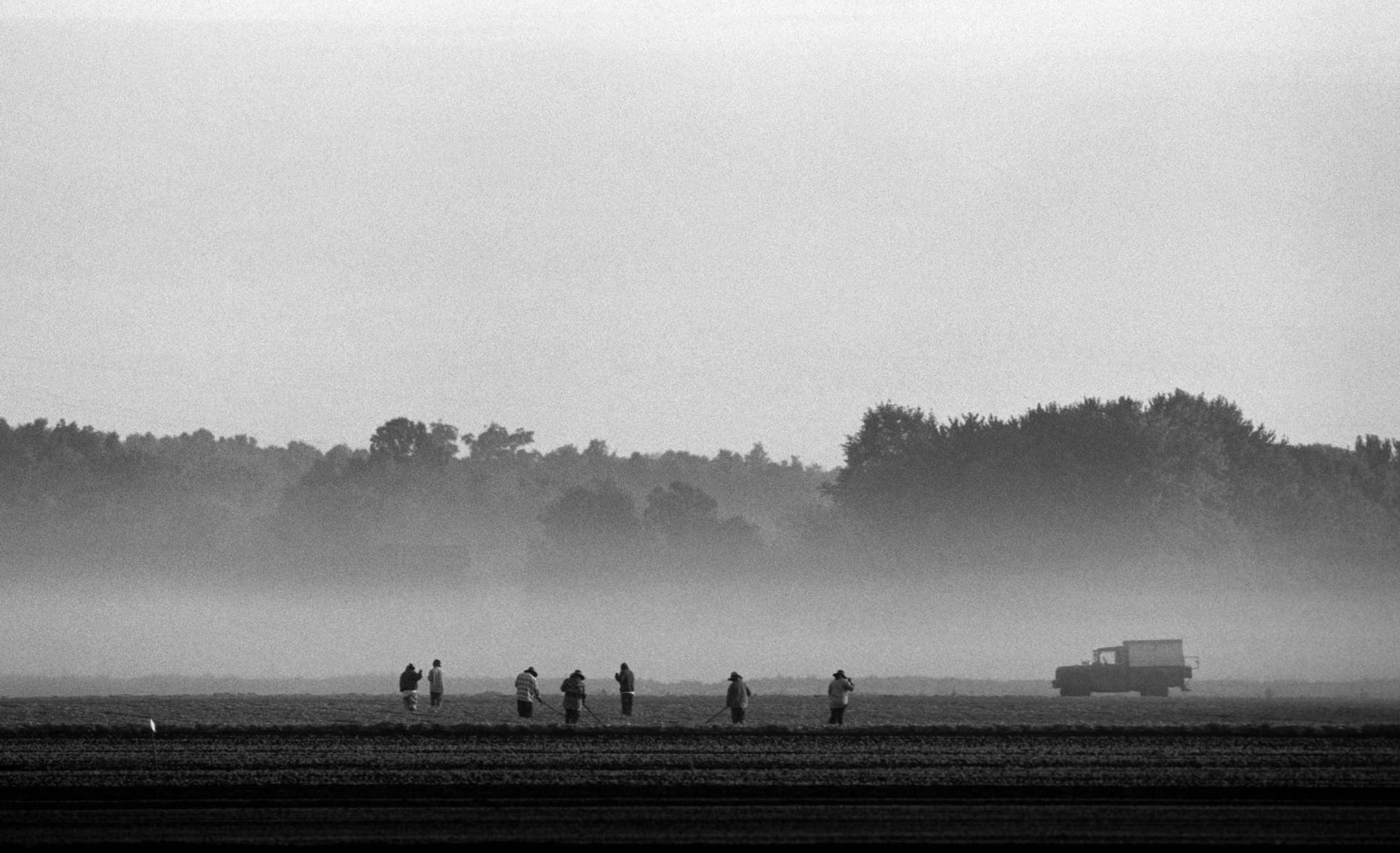While politicians vote to build fences along the border between the U.S. and Mexico, in Hartville, Ohio, the relationship between a family-run farm and its Mexican employees shows how immigration can benefit the people of both nations.
When they set out to document the lives of Mexican migrant workers in Hartville, author David Hassler and photographer Gary Harwood expected to find examples of injustice, deprivation, and misery. Instead they found a functioning seasonal community, rich in culture, to which entire families return each year. The work is hard and dirty, and the workers struggle to support themselves and their dependents. But, Hassler writes, “to capture only the difficulty of their lives would be to portray the migrants in a way that would be woefully incomplete. While they may be poor by American standards, these migrants do not lead impoverished lives.”
Hassler and Harwood interviewed and photographed not just the workers but also their employers, the owners and operators of the K.W. Zellers and Son family farm, which grows lettuces, radishes, green onions, and herbs for shipment all over the eastern United States. To complete the picture, the authors spoke to local residents who provide services and assistance to the migrants, particularly through the Hartville Migrant Ministries. They assembled their interviews and images into the book Growing Season: The Life of a Migrant Community, which was published this September by Kent State University Press. Additional materials, including lesson guides for teachers, can be found at www.growingseason.net. “Field Notes” is excerpted from Growing Season. © 2006 by David Hassler and Gary Harwood. It appears here by permission of Kent State University Press.
— Ed.
Beatrice Gutiérrez
My day starts at about 4:50 in the morning. I get up and make some tortillas. Then I make some tacos to take out to the fields for our ten o’clock break. We like to eat our lunch then, so that we can come back here at noon during lunch and just rest for an hour.
I’m the only woman in our crew, but I’m the crew leader. I get the report of where we’re going to work before I drop off my kids to catch their school bus. Mostly everybody on our crew is a family member from my husband’s side of the family. We are blockers: we block the kale and romaine and red-leaf lettuce and make sure the plants have enough room to grow, so when they’re harvested they are big enough to cut and send out to the stores. And the red beets, cilantro, parsley, and onions we weed.
Since I’m the crew leader, I figure out how much we’ve done at the end of the day and divide it up among everybody in our group. I’ll say we finished fifteen or twenty rows each at two or three dollars a row. I add it all up, and sometimes we make seventy or eighty dollars per person for one day. At the end of the week, we have something. Some weeks, among my husband, son, and me, we can make twelve hundred dollars as a family and save six hundred of it.
I’ve always been in migrant work. My father was born in Mexico, and my mom was born in Texas. I grew up in Florida and have been working with my parents in the fields since I was small. Back then you could start working before you were sixteen.
We’ve been coming to the Zellers’ farm for twelve years now. They always give us the same place to live. That’s what we like about it. We feel more comfortable not having to move around every season. On Saturdays our work ends at noon. As soon as it ends, we come home and take a shower. Sometimes we go shopping. I love to go to garage sales in Hartville or to Wal-Mart. They have everything cheaper there. On Mondays I’ll go to the Migrant Center thrift sales. Wednesdays I usually go to Bible study at the Migrant Center. Sundays I still get up early — seven at the latest — so I can start washing all the clothes. I usually don’t finish until three or four in the afternoon. And when I’m done, I sit down and rest, and I don’t want nobody bothering me.
I’m not ready to retire yet. I still want to work. I just had a baby on May 12. Now I have four children: two girls and two boys. I want to see our children get their education first. They have it both ways. We go back to Mexico after the season ends, and they go to school down there. My son wants to become a mechanic. I tell him that’s OK by me, as long as he finishes school. I’ll make sure he don’t get married first. I always tell him that and not to have a baby neither. ’Cause if you have a baby, then you have to keep on working, and that is a big obligation.
Waiting for the day-care bus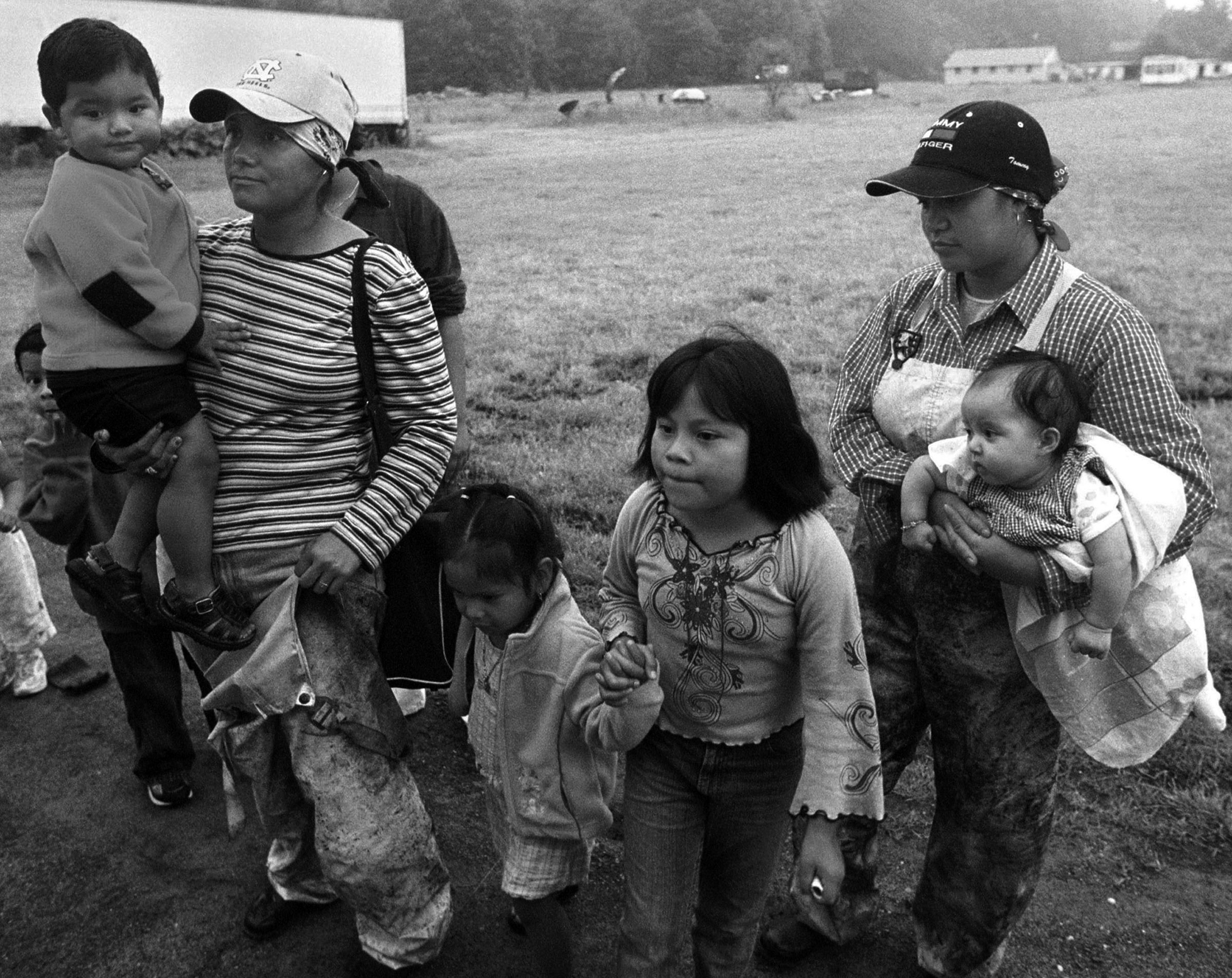
Ivan Soto
I learned English almost by myself. I would practice an hour and a half every day after work. A lot of people prefer to listen to music or sleep, or to kill time with other things, but practice is what I did. I learned a lot of words every day that I tried to keep in mind. And I talked to American people. If you want to learn, you can little by little. I tell everybody we’re here in the United States, so we ought to speak English.
My dad was the first of our family to come here ten years ago. The next year he came with my mother. Then two years later all of us came. Now we work together in one crew: my mom, my dad, my brothers, my dad’s sister, and my cousin. It’s nice to work all together with your family. Sometimes when we are very busy and have a lot of weeds, we’re silent. We concentrate and just think about what we are doing. When we are not too busy, we have a little bit of time to be talking while we work. We talk about too many things — things that we did a long time ago, or things about Mexico. It helps a lot, but the work still is hard, especially when it’s hot.
This year I asked my boss if he could give me a small house or something like that, because I am waiting to bring my wife and son. He gave me a place next to my parents’ house. I have two bedrooms, a bathroom, a little living room, and a kitchen. Right now my wife is down in Mexico with my son. He is one year and eight months. I am waiting for some forms to get my wife a resident card. A lot of people come to the United States illegally, but I don’t want to do that for my family. I don’t want to take that route.
Four years ago I went to Akron to start an application to get U.S. citizenship. They asked me a lot of questions and then nine months later sent me a letter saying that I could apply for citizenship. When I went to Cleveland, the officer called me to his office. I think maybe he was from the Philippines, because he spoke Spanish fluently. He seemed angry and told me in Spanish, “I’m sorry. I was checking your notes, and you don’t have the right time living here in the United States, so you have to wait more time.” But I knew I had the right time living here. He said, “If you want to do the test, you can do it, but it’s not going to count.”
Later, I was checking all my papers, and I was counting the months. I know you have to have thirty months — and I counted thirty-five months. The lawyer who I went to in Akron asked what had happened with my case. She sent a lot of letters to Cleveland, and she never received an answer. She told me I should put in a new application, so I did, and I had to pay again.
The next time I received a letter, I was in Mexico, where we live twelve hours from the border. I took a bus all the way here and stayed with my neighbors Bob and May Nichols. I told Bob and May I have to study the questions. I know only thirty of the easy ones, but I have to know a hundred questions about the amendments, the Bill of Rights, everything. Who was the first president? If the president dies, who’s going to be the next president? How many stars has the flag? How many stripes? What do the stripes mean? Questions like that are the easy ones.
The next morning I went to Cleveland, and it was a very different person in the office than the first time. She was a lady about twenty-seven years old. She asked me my name, when I was born, and then said, “Are you ready?” I said yes. So we went to a room, and she began asking me questions. There was a camera beside a big table recording me. Somebody had told me she was going to ask about twenty of the hundred questions, but you don’t know which ones. She asked me thirteen questions, and I knew all thirteen, so she stopped asking. Then she said, “Are you ready to write something?”
“Oh, yes,” I said. It was something very easy, like “I live in the state of Ohio.”
The official ceremony was May 10 at the Palace Theater in downtown Canton. I wore a suit. They never talk about it, but somebody told me you have to wear a suit. We were thirty to thirty-five people from different countries. I know there were two persons from England and a lot of people from Russia, but there was only one from El Salvador, and only myself from Mexico. I don’t know where the other people were from. We were all on the stage seated in chairs. There were probably like two hundred people in the audience: family and friends and other persons, and students just looking to see the process.
We had to hold our hand up and take an oath. We had to promise to fight if there is a war, to protect this country. We all repeated after a person with a microphone. Then they gave us certificates one by one, and we shook hands with about five different people. When we were finished, I gave my green card to a man, and he had me sign a citizenship paper. Then they gave us a sandwich and some fruit.
My family was happy when I got my citizenship. But that day I went back to work like a normal day. I’d lost a lot of days of work because I’d gone two times to complete the form in Akron. It was a lot of money for the application, too, and I had to put in an application twice. I was counting the money I paid — the lost time, the fingerprints, and the letters — and the amount is probably about three thousand dollars. It’s a lot of money and time, but it was worth it. I have what I was fighting for.
Empty crates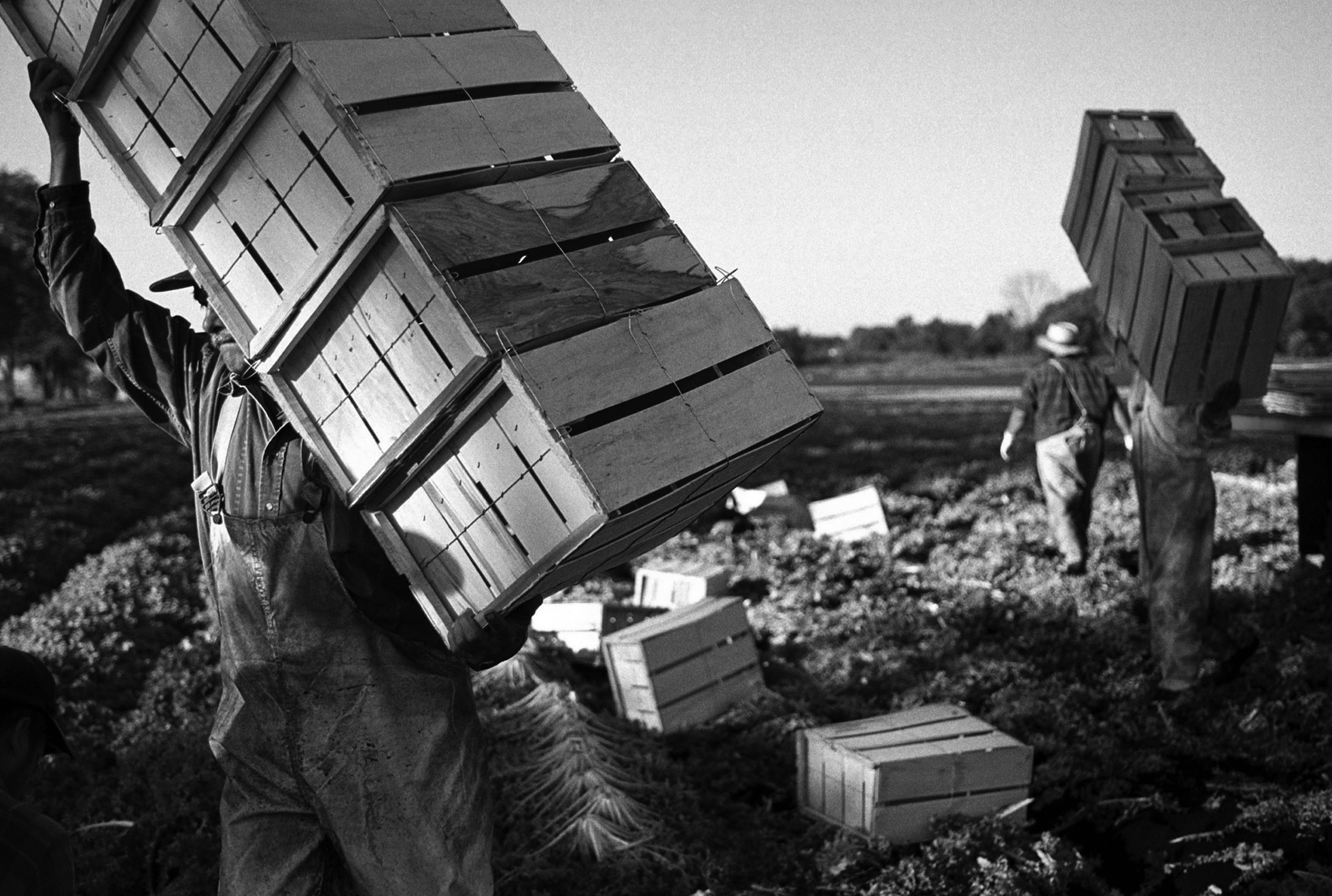
Jeff Zellers
My grandmother and grandfather started the business back in the 1920s. During the seventies and early eighties, a lot of other small family farms around here were sold. In many cases the younger family members didn’t want to continue the work. I actually had intentions of going to law school, but in 1987 I was given the opportunity to come back and join the family business, and I took it. We needed help with sales, marketing, and finance, and since I have a degree in economics, it seemed to make sense.
My cousin David Zellers works directly with our labor in the field. In order to communicate well with our employees, to speak their lingo, he went down to Mexico — not along the border, but well into Mexico — to learn Spanish, even though most of our crew foremen and a lot of our key people speak English also. I always joke that our employees’ level of English-speaking comes up or goes down depending on how much they want to know or not know. We usually just laugh about it and go on.
Family is very important to our workers. There are pluses and minuses to having such large extended families here, but for the most part we think it’s very positive. When they arrive, you know that they are here and are not leaving until the family is leaving. We do not deal with as many conflicts as we used to, I believe, because of the family unit. And religion plays a very big part in their lives, too.
I shop in the same grocery store that they do on Sunday afternoons. These people are very proud, so when they go to the store on Sunday, they’re cleaned up, dressed up, and very respectful. They are a big part of the economy in this town. Between ours and another farm, there are more than three hundred people here in the summer. If all of them are shopping at the grocery store in Hartville, or even half of them, it adds up.
These people are very proud of their work, too. That doesn’t mean that there aren’t days when they are angry with K.W. Zellers and Son or when K.W. Zellers and Son is not happy with the work they are doing. Same as with any other employer. But from my standpoint, I’ve always taken the attitude not to treat them like a seasonal or migrant laborer but simply a laborer, a valued employee. There is an expectation for them to do their job, and if they are doing it well, we are going to wholeheartedly treat them the best we can.
Hartville is a unique community, because for the most part it is a middle- to upper-middle-class, white, Anglo-Saxon community, but for twenty weeks every year, between late spring and early fall, it has this large minority population. If you go back a generation or two, these workers were very much a part of the life here; everybody knew about them because so many people had ties to agriculture. Today a lot of people can’t understand why all these Spanish-speaking people are here. They don’t realize our farm is located so close to Hartville. They’ve lost touch with how their food is grown and how it comes to them.
There’s a great misconception that when these migrants come into our country, they are actually taking jobs away from citizens. But most of the jobs in agriculture are not going to be done at any pay rate by the remaining people that are unemployed in this country. It is just a plain reality. We’ve hired people and watched them come and go. We do have some local people who are great employees, but we will go through twenty in order to find one. The work we do here is specialized, and the crops we grow are labor-intensive. We need people that know how to harvest and pack them.
We house about 150 people that work for us, plus their families. All of our housing goes through a licensing process with the State of Ohio. Each year the Ohio Department of Health licenses our labor camps. It can be a challenge, because we must provide a certain amount of square footage per person. Ideally you want both husband and wife to work if you are providing housing.
Some years the Immigration and Naturalization Service comes and looks through our paperwork to see that it’s filled out accurately. Our role as an employer is just like any employer. We fill out an I-9 for every worker; they can be in category A, B, or C. We don’t want to hire people who three weeks later have to leave because Immigration and Naturalization comes in and says their paperwork isn’t right. That has never happened to us. So we look to see that their paperwork is not tampered with and that it has the proper information. And if everything checks out, we hire them.
The immigration issues are challenging since September 11, and they are going to continue to be so. I know the Department of Homeland Security has stepped up border patrols, and that’s great. From a terrorism standpoint, I don’t mind taking off my shoes and belt when I go through the airport. I want to know when I get on a plane that I’m safe. But there needs to be a balance. We can’t do everything out of fear of terrorism and lose sight of the fact that many industries, beyond just agriculture, need a stable migrant labor force in this country. I think this message is being lost. It’s easy to grandstand, to stand up in front of the cameras as a congressman and say, “I’m going to do all I can to close the borders.” But we have to balance our need for labor in this country with our need for a high level of security. I think it’s important that people recognize these folks are here and not turn their back on them. Don’t say you’re going to close the border. These workers simply want to come here and make a better life for themselves.
Some of our workers, I know, are saving money to build a house in Mexico. The buying power of what they make here is tremendous when they go to Mexico. When you have workers that take their families and move back there and live permanently because of the money they’ve earned working for us, is that a bad thing? You have to replace that person, and replacing an employee is expensive and risky. But on the other hand, I’m not going to be mad at someone because they’ve made a better life for themselves.
I like to talk about the human element, but all this makes sense from an economic standpoint, too. If we don’t have a good, consistent workforce, we’re out of business. And if we don’t take care of our workers, they won’t come back, and we’ll have to retrain 160 people every year. I’d like to change people’s perceptions, so they realize these workers are a viable part of the economy — and not just in Hartville, Ohio.
Dr. Teresa Wurst
The migrants call me “la doctora.” That’s the name for a female doctor. Instead of calling me Dr. Wurst, they just say, “la doctora,” because I used to be the only female physician who came out to the Migrant Center. They all knew who they were talking about.
Aultman Hospital frees up my schedule so I’m not missing a day’s work to come out here. When I started in 2002, I thought I would just show up and see patients, that there would be a schedule and everything would be organized and set up. I found out that was not the case. I also thought I could use my high-school Spanish, but I got here and realized I had forgotten just about everything I had learned, and what you learn in high school is not really practical. I soon got books and tapes and CDs to help me learn. So every day I’ve got something in the car about Spanish. I can get through a patient interview now on my own, but I couldn’t even begin one when I started.
I still have interpreters at the clinic as much as possible, because if you miss a word or two, you might miss the boat on what the patient is there for. I had a young girl who was pregnant come in with her mother. She was fourteen or fifteen years old and had been raped, but I didn’t know the Spanish word for rape. I thought, Well, she probably has a boyfriend, or whatever. I didn’t really understand what she was saying. Fortunately I had an interpreter that day. She realized what was really going on and explained it to me. The rape had happened in Mexico, so we really couldn’t do anything to prosecute the rapist. I asked what the Mexican police would do, and they said the police would do nothing. I was appalled. We talked about what she wanted to do with the pregnancy, what her options were, and I got ahold of the Rape Crisis Center. We were able to find someone there who spoke Spanish and could counsel her, and we set up an appointment. It made me realize how important it is to always have an interpreter.
TB test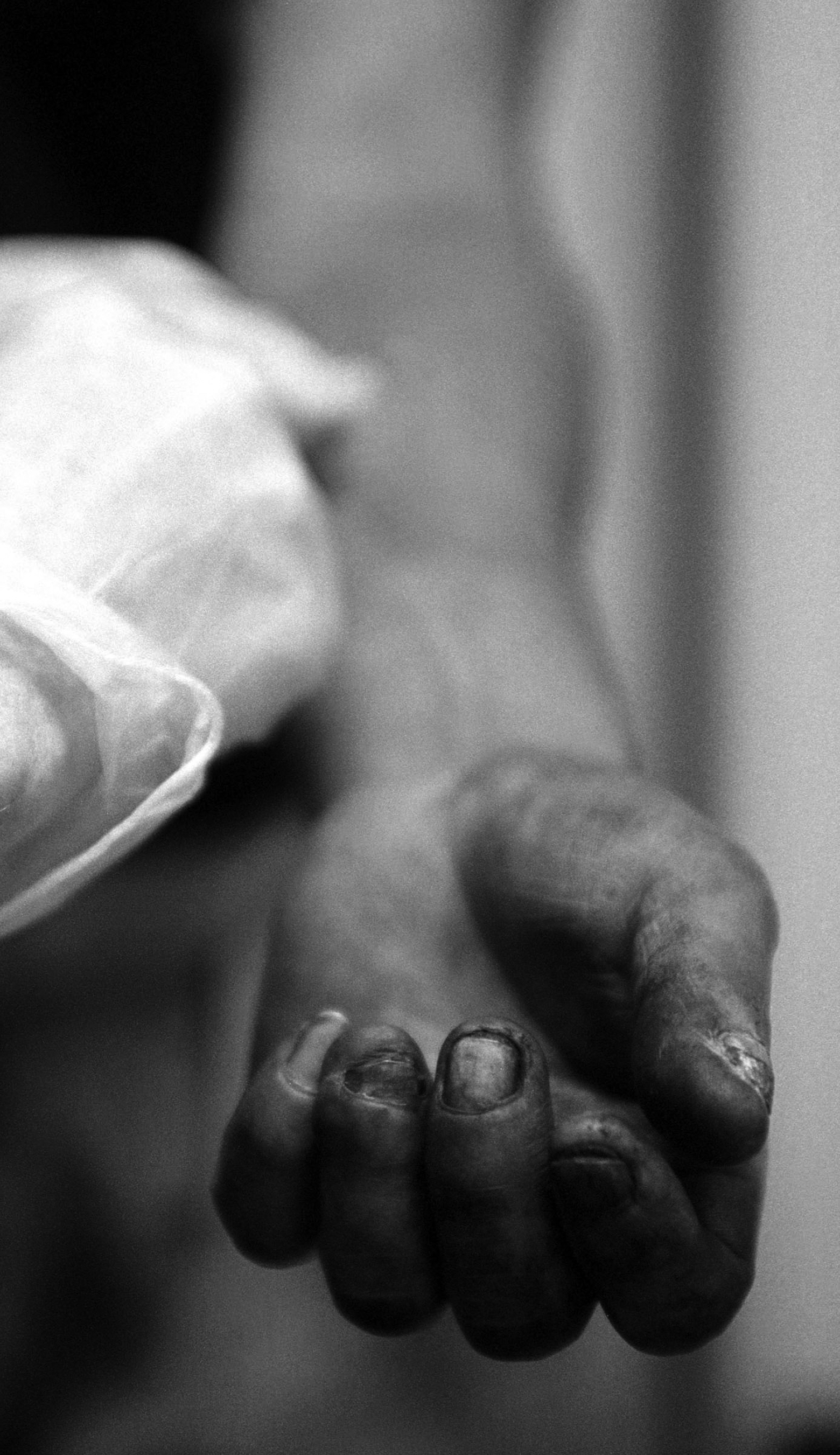
When I first started here, I was concerned that nobody was being tested for tuberculosis [TB]. Most of the migrant workers come from a very high-risk population for TB. I said, “We really need to do this,” and the growers agreed. They basically told the workers that they had to be tested in order to work here. So Dr. Laura Wyss, a nursing instructor from Malone College, wrote a grant to cover our costs for the testing. Our first year we had somewhere between fifty and sixty positive cases of latent TB. This meant they had been exposed in the past to someone with active tuberculosis, but they weren’t active cases themselves. They all still needed treatment to prevent reactivation of the dormant TB. Laura literally went out into the fields, knocked on doors, woke people up, and said, “Hey, let’s get your TB test.” Every year now the number gets smaller and smaller. Last year there were probably only about twenty cases, not a lot. But that first year it was like an epidemic.
Initially I saw only women and children. There were no men coming to the clinic. I thought, That’s interesting, because I’m sure there are a lot of men out there. But, culturally, to see a female doctor was a problem for them, as it is for some men even in this country. Perhaps they thought I didn’t know as much. I don’t know what the issue was, but I wasn’t one of them, and I didn’t speak very good Spanish. After I took care of their wives and their children for a year, though, I think they thought, Well, maybe she’s OK, and slowly they started to trickle in. Yet it wasn’t until we did the mass TB screening that I really got to know the men. Once I sat down and talked with them and gave them information and free medicine, they started to trust me a little more.
We also started a free-condom campaign. I piled condoms in baskets and put signs up. The men had to find some reason to come in to get the condoms. One day I was seeing a little boy for an ear infection. I was looking in the kid’s ears, and his dad was very slowly stuffing his pockets with condoms. I was trying hard to not appear like I was looking. The kid really wasn’t that sick. Then I heard the little boy ask his father, “What are you doing, Daddy? What are those?” “Oh, nothing,” his father said.
I never give out my home phone number in my private practice, but I do on occasion with these migrants, because they really don’t have anyone else to call if there is an emergency. It’s funny, because often, when I get a call at nine or ten o’clock on a Sunday night, my husband will hold out the phone and say, “There’s someone speaking Spanish on the phone.”
I once got a call on a Sunday night, and it was the cousin of a patient I had been seeing, a single man about nineteen or twenty years old who had recently had an infected cyst removed from his lung at Aultman Hospital. It was a serious operation that had saved his life. Apparently, he was really short of breath and was in a lot of pain and coughing up a lot. I told his cousin to call an ambulance or take him to the emergency room, but he didn’t want to do that, and I couldn’t convince him. It was about 9:30 at night, and he asked me if I would come out. I know going out at ten o’clock at night, as a woman, to a rural, deserted clinic on Swamp Road is probably not the smartest thing to do, but I feel safe with these people. I knew this was going to be OK, and there would be other people there. So I drove out to the clinic and said, “Where is he?” “He’s too weak to come,” his cousin said. “You’ve got to come to the house.” So we loaded up my car with some blood-pressure cuffs, an oxygen monitor, and other equipment, and I drove out to his camp.
When I arrived, he was sitting up in bed in his one small room. There were religious candles lit all around him, and everybody was standing by his bed. He looked to be in a lot of pain. It sounded like there was a lot of fluid in his lungs. But it was difficult to know how serious it was without an X-ray. I checked his vital signs and said, “We really need to call an ambulance.” Only then, with me there, was it OK for them to call an ambulance. It was a matter of trust. So the ambulance came, and pretty soon there was a large crowd gathered outside his house. I called ahead to the hospital, just to make sure there was someone in the emergency room who could speak Spanish. It turned out he was not ill enough to need readmission to the hospital, and he went back home after being treated in the emergency room.
My faith is a strong force in my life. It’s a big thing for me to work where I can make a difference, where I can use the gifts that God has given me to help people with little or no access to healthcare. I try to remember what Jesus said: “When you did it for one of the least of my brothers, you did it for me.” These migrants are a very hardworking group of people. They want to work, even when they are sick. And when something happens to somebody, everyone pitches in and tries to help.
One of the things that really strikes me about these people is that, despite the situation they are in — working long hours in a miserable, hot rubber suit, kneeling in muck — they’re very happy people. It’s refreshing to see a group of people that are content with what they have and are thankful because they have their family close by and can provide for them.
Birthdays are always a big deal in the migrant community, a reason to celebrate. I’ve been to quite a few parties now, and they’re always fun, usually with fifty or sixty family members and friends. I wish I could take some of my private-practice patients who complain about every little thing out to the camps and the Migrant Center and say, “Look. Appreciate what you have.”
Coming out here is the best part of my week. I always get excited in April before the growing season starts. We have meetings and order supplies, and I go out to the clinic to clean. I take my scrub bucket and Lysol and scrub all the rooms down to wash away the black dirt that has settled on everything. I get my nine-year-old son, Nicholas, to come with me, and he helps me clean.
Every year the migrants come back and ask, “So, did you learn some more Spanish this year?” They like to joke with me. You know you’ve been accepted when they start inviting you to their birthday parties, and they all want la doctora to hit the piñata.
Moises Mata
I used to travel back and forth from Mexico to Texas to visit friends. When I was twenty-seven years old, I married a woman who lived in Texas. I took the opportunity to get a permanent-residence card and started playing in a band. In nightclubs we played tropical music, slow pieces, and country. I wrote many of the songs for our band, and we recorded them. All my life I have loved to play guitar and sing. Music was my first passion.
Moises Mata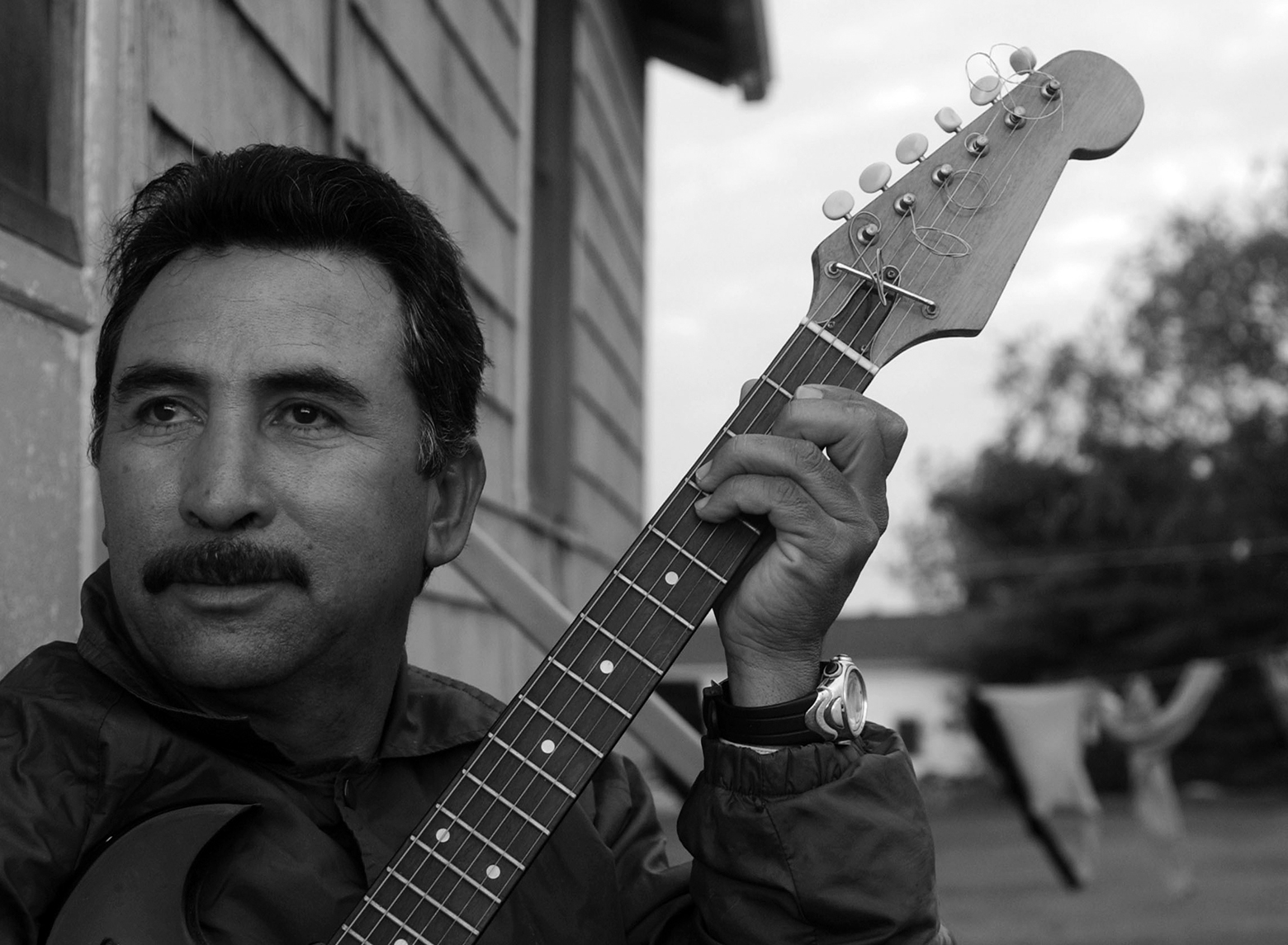
During the day I was a driver for the City of Brownsville. I would pick up older or disabled people from their homes and drive them to the hospital. I did this job for many years, but the pay was not very good, and I got tired of it. So one day I decided to find another kind of work. I called my father, who was working at the Zellers’ farm, and he told me I should come up north with my family. He would get me a job on the farm. So for seven years we have been coming here.
Now I drive a tractor and go behind the crews to water, connecting the water pumps and the irrigation pipes in the fields. It’s good work, but it’s hard physically. I’m forty-five years old now. I like to say I’m forty-five years young, but I wonder how many more years I can do this work.
I used to teach sixth- and seventh-grade science in Mexico. I did that for six years, but the salary for a schoolteacher then was very, very low. Now I am considered too old to get a job as a teacher in Mexico, so I want to go to college in the U.S. and get my teaching certificate. Then maybe I can get a job teaching in Texas. If I can, I won’t come back to the Zellers’ farm.
When I’m alone driving the tractor, I often sing. My partner Craig does not speak Spanish, so I don’t sing when he’s with me. But when I’m with a Mexican crew in the fields, I’ll start to sing, and they will sing along. The proudest thing I know is to sing.
My father, too, liked to sing. We would often sing together. Like me, he used to sing while he was working in the fields. He died last year, when he was sixty-six years old. He had just retired and was living back in Mexico. At the funeral I did not look at him in his coffin, because I wanted to remember him how he was alive. Now I think of him every day. I dream of him often. I think he comes to visit me, and I talk to him. He never says much, but he is always smiling. I know he is still living in me.
I always carry a pen and a notebook with me when I’m working, and if an idea for a song comes to my mind, I write it down. Two weeks ago I wrote a corrido for my father while driving the tractor, trying to remember how my father was. I often see his old crew members in the fields and in the place where my father used to live. Every time I had an idea, I had to stop my tractor and write the words down in my little notebook that I keep in my shirt pocket.
I worked on this corrido for two weeks and just finished it. I’m still thinking about the melody, because I want to make it different from my other songs. Sometimes I have the idea for a melody first, and then I write the words. But sometimes I write the words first, and then I must think of the right melody. For now I just have the words. It is called “El Corrido de Don Pancho.” A corrido is a popular Mexican song, like a ballad, that tells the story of a hero or of something that happened in a certain place. This one is the story of my father. His name was Francisco, but Pancho was his nickname. When I get the melody, I will sing it. I will sing this corrido for everybody.
Sister Teresa Ann Wolf
A long time ago I provided pastoral ministry at the Papago Reservation in southwestern Arizona, which touches the Mexican border. Because I was working with different villages, I was on the road a lot, and many times I would encounter Mexicans coming through the desert looking for work. Of course, I knew it was against the law. At that time the numbers were not nearly as great as they are today. And the dangers were not as great, either. But I knew they were always at risk. It was easy for them to die in the desert.
So I would pick them up and take them to the closest town to the reservation, which was Casa Grande. I knew a Mexican American man who had a gas station there. He told me not to bring them directly to him, because he would be liable, but to drop them off a few blocks away, point them in his direction, and tell them they could get water at his station. “Then I can’t help it,” he said, “if they ask me where to go.”
So I did that, and it awakened in me a greater interest in social justice and workers’-rights issues. Why is it that this is happening? What are the pressures on both sides of the border? What are these people’s rights as human beings? What are our obligations? I began to think, What more could I do than simply give rides to the few people I see trying to cross the desert? For one thing, it spurred me to want to improve my Spanish.
From that reservation, I volunteered to go to Guatemala and then to Peru. When I came back from Peru, I didn’t want to lose the Spanish that I’d struggled so hard to learn, or to stop working with the Hispanic population. I thought I’d have to go to Texas or back to Arizona. I didn’t realize there were Spanish-speaking people all over the United States, nearly everywhere.
After working with Hispanic populations in Minnesota and Wisconsin, I am now the coordinator of pastoral care for migrants and refugees for the Tri-Diocesan Mobile Migrant Ministry of the dioceses of Cleveland, Columbus, and Youngstown. I work with migrants and refugees, newcomers, and recent immigrants in this area. And we know, practically speaking, that about 95 percent of these newcomers are Spanish-speaking. I usually go out to the people; very few of them come to my office in Canton. During the summer I may go several times a week to the Hartville area to visit people in their homes or in the hospital, to pray with them, to help them in any way that I can.
Sunday Mass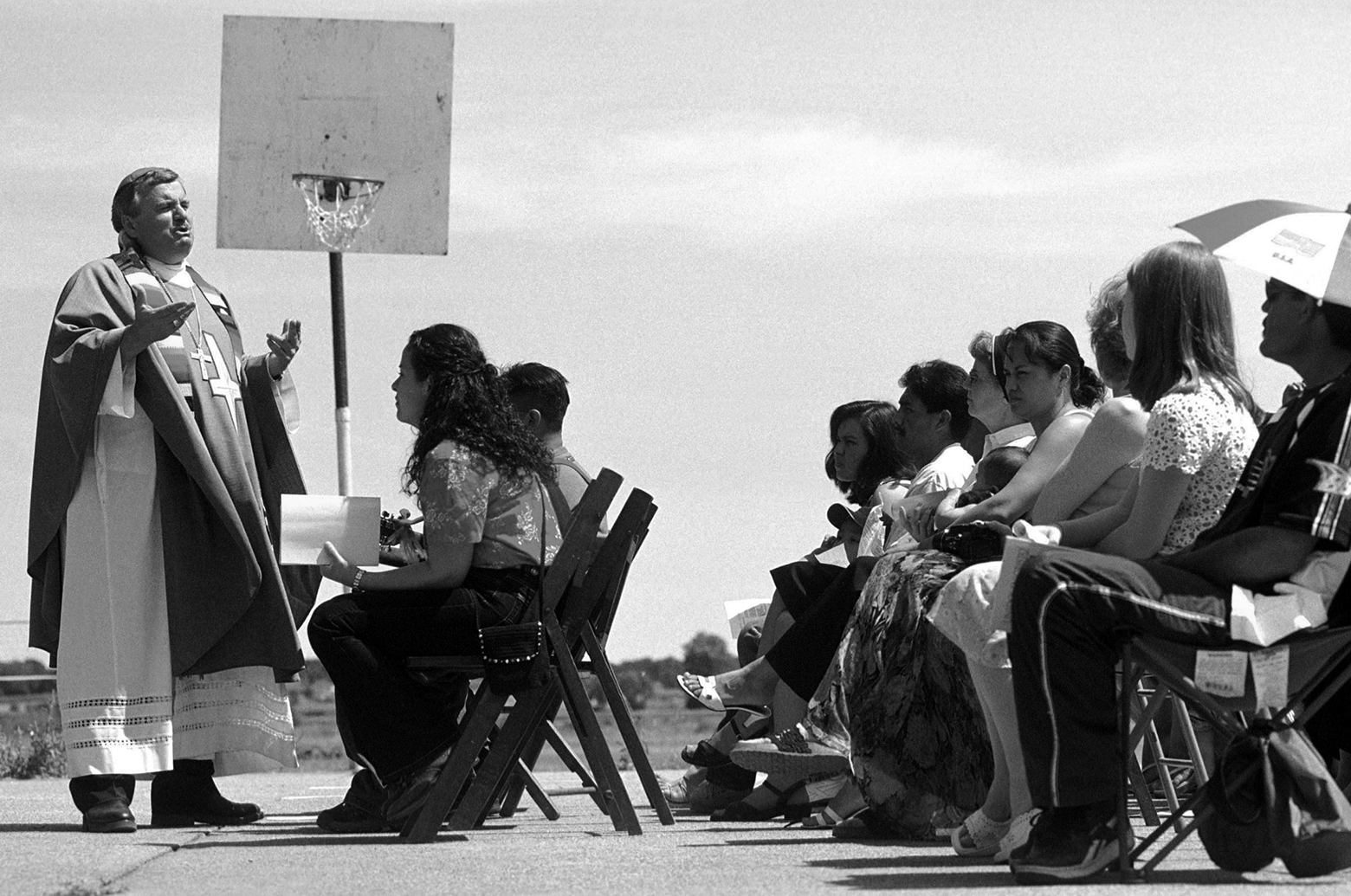
I think especially since the Second Vatican Council, social justice and human rights and workers’ rights have become much more prominent in the Church, although not all Catholics are in agreement. There is a group that believes if you go to church on Sundays and say your prayers, that is enough; politics and social action should not enter into religion. Well, you can hardly live the Gospel, much less preach it, if you don’t take seriously what Jesus says about helping the poor and oppressed and caring for others.
Recently the Mexican and American bishops met to address some of these issues. They published a pastoral letter, “Strangers No Longer: Together on the Journey of Hope,” which talks about the dangers of migration and trying to keep families together. This kind of support is really needed, and yet the sad reality is that some dioceses have other priorities and are decreasing their support for migrant ministry just at a time when it is most needed.
I think many times, when people hear statistics of how many Latinos are in the U.S. or in Ohio, they are amazed. They simply don’t believe it, because they don’t see these people. There is a tendency for Hispanics to be invisible. Sometimes it has to do with past history: They have had some very painful experiences. They suffer from prejudice, so naturally they want to escape notice. Most of them fear that if they make a complaint, they will be deported or something else bad will happen to them.
Because I have worked with Latinos in Arizona, Latin America, Minnesota, Wisconsin, and now in Ohio, I feel that in many ways I’m a migrant, too. I love what I do; I wouldn’t want to do anything else. This is fulfilling work. These are good people, and we are growing together. It’s an important, exciting ministry of the Church, and much needed. We cannot be intimidated and let migrants and recent immigrants be pushed farther into the margins and become even more invisible. They have a right to live their lives with respect and dignity. They have a right to be seen and heard.
The Soto family at work